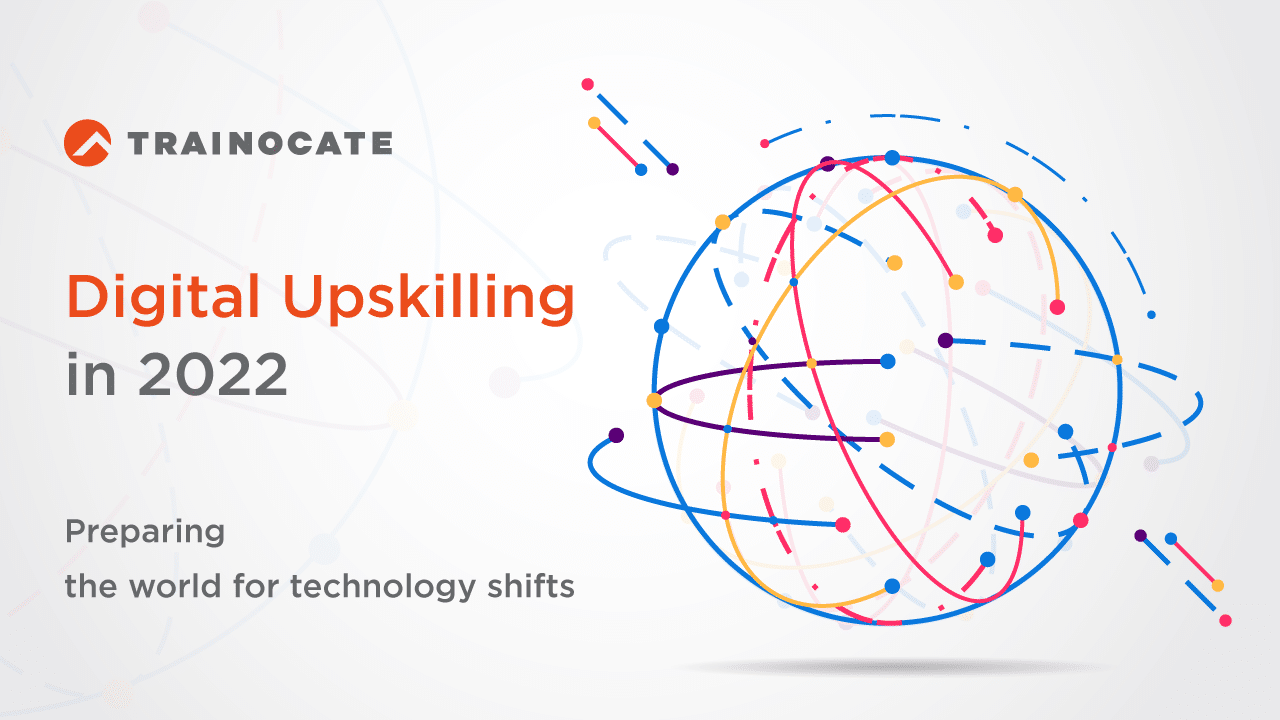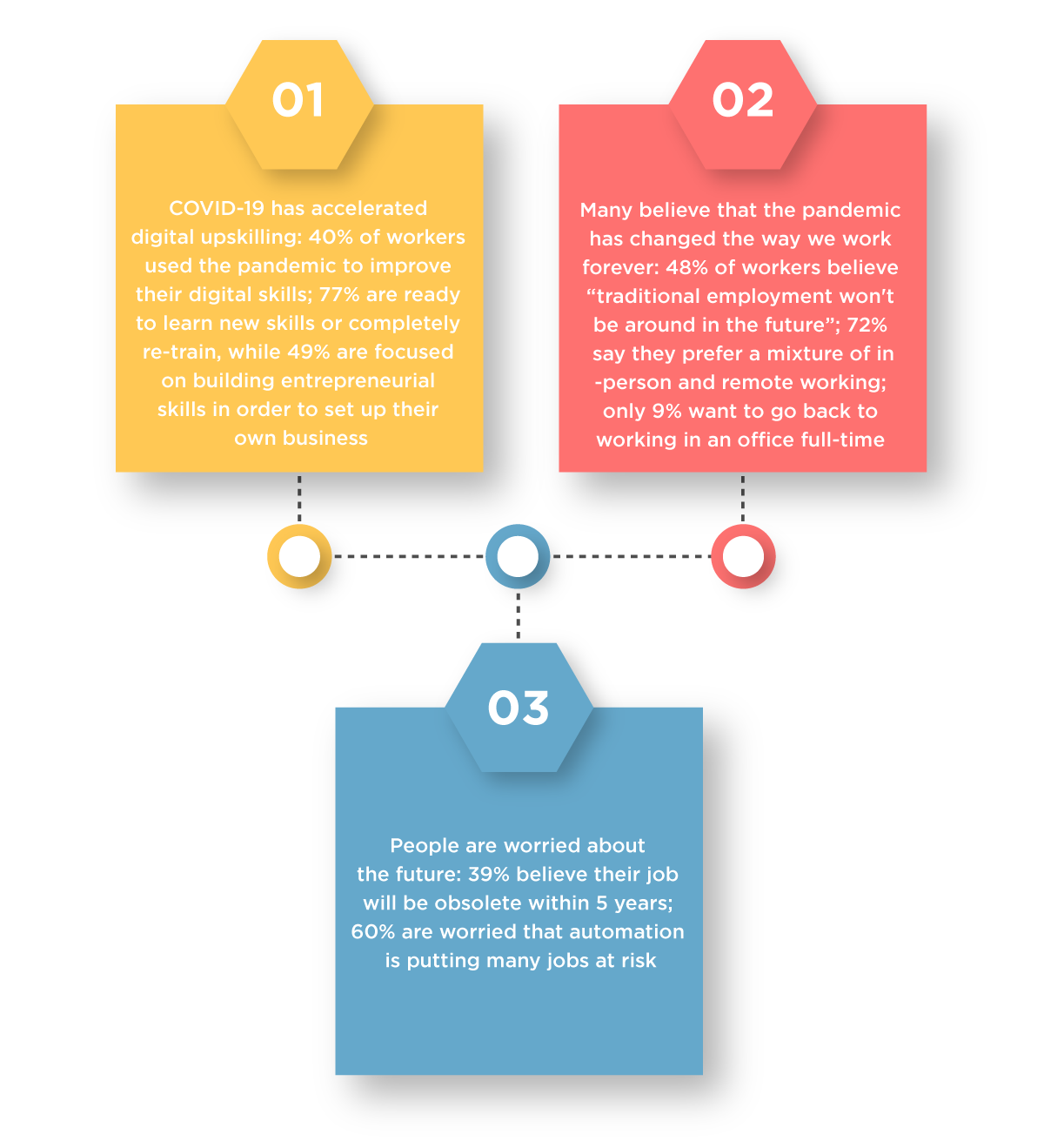Digital Upskilling in 2022
Digital Upskilling in 2022
The pace of technological changes are requiring large scale upskilling efforts.
Rewind to the 90s, and technology upskilling simply meant learning to use Microsoft Office, navigating the internet, the email and increasing your overall productivity using the computer. But so much has changed since then. In this day and age, it means, being able to create new tools to do things faster and with increased accuracy, leverage cutting edge technology, write code and stay agile with adapting to a technology-driven world.
With the dawn of the new digitalized world, you are bound to need new skills to survive and stay relevant. Many find this to be an exciting prospect as it speaks for the progress made within the tech landscape. As it seems that most CEOs and leaders are also in agreement with this notion. The sheer speed, scope and impact of technological shifts are posing to be a challenge to their business and society at large. When the World Economic Forum happened in Davos, the main question remained – ‘How are we preparing our people for these changes?’ especially as we navigate through the pandemic and soon after, the aftermath of it.
It goes without saying that upskilling your workforce is not an option for most organizations but is now an absolute necessity. Employees are required to gain the knowledge and skills to remain relevant and keep up with the dynamic shifts, as new technologies enter their place of work.
Similarly, an important factor to highlight is that although, technical skills such as coding, data analytics, and cloud computing are important the overlap and blurred lines between tech and other departments have emphasized the importance of other non-technical skills as well such as leadership, communications and presentation prowess. The overall goal of holistic upskilling now boils down to ascertaining that your employees are technically competent in using the software as well as hardware in order to work as a collaborative force and catapult your business forward.
Upskilled and reskilled employees tend to be able to leverage the latest technologies, getting more for the miles by being able to complete their tasks at a much faster rate and with higher accuracy. Possessing this prowess will also translate to preparedness in helming higher positions that might require strategic thinking and strong management skills.
Upskilling is your sure shot at effectively managing your people and boosting your organizational productivity and ensuring that your workforce would be able to keep up with your innovation strategies.
“So digital upskilling is about enabling people to operate in a world where technology is evolving rapidly. Digital upskilling is about continuous learning and adaptability. You may not need to know how to code, but you need to understand and use technology to access information and services.”
The Pandemic and Upskilling
Upskilling is no new fad, but the pandemic has definitely accelerated it.
According to a report by the International Labour Organization, “approximately 65 per cent of the enterprises and organizations surveyed took active measures to continue upskilling and reskilling their employees”
What the COVID-19 pandemic has done is essential, accelerated the changes in the demand for skills and raised the possibility of structural shifts in labour markets around the world. With this comes the urgent need for quality training to support a robust economic recovery.
Here’s what the PwC’s report reveals:
Digitalization and the current work landscape.
In the US alone, almost one-quarter of jobs are at risk due to the rising move towards automation. McKinsey has estimated that 4.9 million US workers would require upskilling or reskilling to remain employed in the bustling digital economy. This is aside from the fact that there were many people who have left their low skilled jobs with no intentions of returning to them. It is said that the global number of digital jobs is set to grow exponentially from 51 million this year to 190 million in 2025. What all this data culminates to and portrays is that if your organization and your people do not adapt and upskill, your organization is surely running the risk to become obsolete and lose out on the competitive edge needed to survive the technical paradigm shifts.
The benefits of upskilling
There are numerous data to show the huge advantages and benefits for companies that have decided to embrace digital upskilling. To summarise, those who do can expect to create a lot more value, not just within their own communities but also for the wider society and overall economy, of course – on top of your own business.
1. Improves employee retention and attracts talent
By having a unique upskilling training, you communicate to your candidates that they can do just that in your company. This will attract candidates who have a personal growth mindset and, in turn, make you a more attractive employer in your industry.
Similarly, by offering training and opportunities to upskill, an organization is more likely to retain its employees by providing chances for growth as well as a balanced output through good productivity.
2. Taps into your employee’s new and undiscovered potential
By providing training in new and existing skills, you may have the chance to uncover undiscovered skills within your staff. This provides your company with a wider base of talent to offer to your customers.
3. Increase staff morale
Many employees need the motivation to feel good about their jobs and perform well. No matter what the motivation factors are for each employee, the motivation within the workplace itself has a direct impact on employee productivity.
4. Build a competitive edge
The worst loss of all you could encounter in business is probably the loss of knowledge and experience former employees took with them when they left your company.
Many people wonder why companies like Google, Facebook, and Amazon are so powerful. This is for two reasons: On the one hand, it is the amount of data they possess and, on the other, it is the workforce that can analyze and interpret the data. In other words, these companies have all the knowledge they need to succeed in their industry.
Have we done a good enough job at convincing you of the importance of technical upskilling? Now, that we have found the problem, let us offer you a solution to it. Let us help you navigate the new digital economy. Find the right course for you and your team and catapult yourself into the future.









